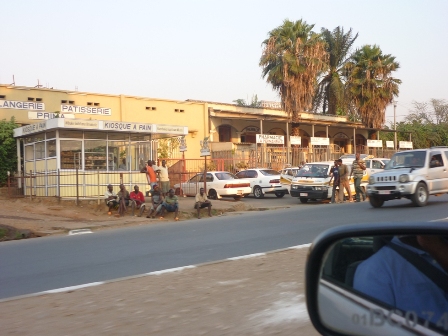
On Friday 26th June, IBJ team headed to Mpimba, the country’s largest detention center, located right outside of Bujumbura. The Director, a woman in her middle age, sincerely concerned about the situation in her prison, welcomed us with sympathy and openness. While explaining that Mpimba was rarely visited by Westerners, she unlocked the doors of every corner of the prison with rare openness.
While the official capacity is only for 400 persons, there are currently more than 1,800 prisoners at Mpimba, both pre-trial detainees and convicted prisoners. Entering Mpimba, one has to hold his breath at the view of such a massive group of people, including men, women, and children, locked in such a confined and desolate environment. I will not forget the smell of food, dirt, dust, sweat, and despair that filled my senses as I walked in.
The visit began by passing a big tent in one of the inner courtyards of the prison, holding people suffering from contagious diseases, such as tuberculosis and HIV. A group of small children, aged from 2 to 5, ran out of the tent when they saw Bazungu walking by, their eyes begging for a sign of attention. A protective hand is all they cared about, and they quickly lended us theirs. Walking hand-in-hand with these kids, we entered the women’s section.
Despite the harsh conditions they face, the women were warm and open. A group of young women spontaneously surrounded me talking in Kirundi. Obviously confused about what they were asking me, I simply smiled at them, and they burst out laughing. Laughter provided the sole way for us to communicate, in addition to aiding them in keeping their heads up. Only later did I understand they wanted soap, which I hadn’t thought of bring.
Despite harsh conditions,these Burundian women were full of dignity. Another woman, Josephine, then run towards us to get our phone number. In perfect English, she explained she had been falsely accused of being an accomplice to robbery, adamantly declaring that she was not guilty; with no lawyer defending her, she had already spent several months waiting to appear before the Judge.
We then moved to the men’s section, which was much more dense and intense. Two wardens and a couple of Kabots kept a close eye on every move we made. We sparked curiosity, most of people wondering what white people were doing in such a desperate and dark place. We walked in a long corridor, crowded with tired human bodies. This corridor seemed like thousand miles long, providing no light, no space, and no comfort at all. You could see inquisitive looks here and there. When detainees tried to get too close to us, or displayed signs of excitement, wardens fiercely pushed them away, which made it hard to really talk to them, notwithstanding the fact that most of them only speak Kirundi.
Inside the corridor, prisoners had reproduced a façade of real life, with small boutiques of cigarettes, other goods, and even a market. From this long corridor, you could access different rooms where the luckiest prisoners have their beds, or should I say, old thin mattresses lying on the concrete floor. In one of the rooms, we met juveniles.
Any convicted adult can go in and out this room without any obstacle. The prison Director later showed us the Juvenile section, which was being refurbished. Mehdi came and talked to one of them. He was 20 years old and had been here for 2 years. Convicted of rape, he had 20 more years to go. Life expectancy in Burundi is not more than 45 years old for man. In prison, I assume this figure is much lower, given the primitive living conditions and criminality.
Acts of solidarity are always striking when misery is extreme. While viewing one of the corridors perpendicular to the main one, we saw women giving food to starving prisoners through the ceiling from the first floor.
At the very end of this seemingly endless corridor, we finally accessed another open garden where many prisoners find shelter. Food was being served. On the right hand side, prisoners were having a shower. I felt ashamed to violate their privacy. We heard a couple “Muzungu!” “Muyungu!” but did not get to have anymore contact with them. To be honest, I was scared, not by the insecurity, but by the misery I was facing. We then turned back and took this long corridor again to go to another courtyard which held the medical center. While it was intended to be were the sick were treated and cured, to me, it rather looked like the chamber to death.
As we eventually walked out of the prison, I was frightened by the sound of the big steel door shutting behind us. This is what will always lock these people away from freedom. Freedom, to which, only lawyers hold the key.